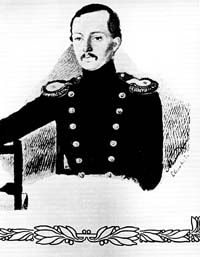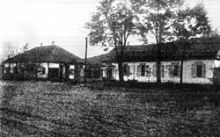1. From Moscow to Novoheorhiyivsk
When Afanasy Fet turned 25, he was a long way from Moscow, where he had spent his youth as a student. No sooner had he completed his unusually long six year university studies than he decided to leave the city of white stone and go south, to the Gogolean steppe. It was a strange twist of fate that a poet whose verses were readily printed by such diverse journals as Moskvitianin (Muscovite) and Otechestvenniye zapiski (Fatherland Notes) suddenly decided to enter the military. It is about him that the literary pundit Vissarion Belinsky wrote, “Of the Moscow-based poets, Fet is the most gifted” (1840). It is his book of poems pretentiously titled A Lyrical Pantheon (1840) that an Otechestvenniye zapiski reviewer praised as follows, “...A. F. is head and shoulders above our well-known versifiers,” although it was about an essentially immature collection with clearly discernible melodies of romantic poetry from Byron and Heine to the early-1840s heartthrob Benediktov.
It was calculated that Fet had published 85 poems before he joined the army (serving from 1841 to 1845). Some of them became widely known thanks to musical wings: romantic songs based on Fet’s verses quickly won the hearts of listeners, especially the ladies. The frequenters of aristocratic salons and nests of the gentry had already read his endearing love words “I have come to you with greetings / To tell you that the sun has risen...” which made them crack an involuntary smile, for these lines showed a striking combination of a youthfully exaltation, enchantment with the beauty of nature, optimism, and simple-heartedness... If it is right that love is always a bit silly, you will hardly find a more convincing prove of this than these moving lines of Fet.
The poem beginning with “Let her sleep at dawn...” was also written in 1842, and Fet did not yet know it would win the glory of one of the most popular Russian romantic songs.
This led Afanasy Fet to suddenly quit all this, leave Moscow, and arrives at the steppe town Yelisavethrad (now Kirovohrad) in April 1845, carrying a letter of recommendation from a neighbor of the Shenshins to his uncle, Corps Commander Dmitry Osten-Sachen. Thus Fet began his military service in a prestigious cuirassiers regiment.
But still, what compelled a Moscow University graduate and a promising poet to become a cuirassier? The researchers of Fet’s life and literary heritage have long known the answer. What compelled him to do so was a trauma the 14-yeat-old Afanasy suffered when he went was a Krommer Boarding School pupil in the Baltic city of Verro (now Viru, Estonia). It is then that he discovered the secret of his origin. It turned out that the OrСl-based nobleman Afanasy Shenshin was not in reality his father! The poet’s biographers have long been unraveling this maze of a story.
In 1819, the 44-year-old Mtsensk nobleman Shenshin, receiving medical treatment in the German city of Darmstadt, met Charlotte Foeth, a 22-year-old Jewish lady who had married local assessor Johann Foeth eighteen months before, had a daughter, and was again expecting a child. Shenshin and Charlotte had a tempestuous affair, and they soon hastily left for Russia. A few months later Charlotte bore a son registered as Shenshin, although his real father was Johann Foeth.
Fourteen years later, the OrСl Ecclesiastical Consistory ruled, after looking into the “Afanasy’s baptismal affair,” that “the aforesaid Afanasy cannot be considered the son of Cavalry Lieutenant Shensin.” For this reason that he was listed at Moscow University as a “student of foreign origin student.” Later, the poet wrote to Mariya Botkina (soon to be his wife), “If you ask me what the name of all my sufferings and woes is, I will say: their name is Fet.”
Afanasy had such a profound shock that he became possessed by, to quote the poet’s biographer D. Blagoi, “a passionate idea” to retrieve, at all costs, the lost family name and the rights of a Russian nobleman. This “passionate idea” in fact prompted Shenshin-Fet to leave the Grigoriyevs’ house on the Moskva River, the “true cradle of my mental self,” and go south. Military service was supposed to pave the way to resurrection, for an officer’s rank gave its bearer the right to nobility.
Yet, there were also other reasons why the Moscow University graduate decided to be a cavalryman. Shortly before, in 1844, his mother had died. He had long suffered from fits of nervousness and “melancholia.” As a result, Yelizaveta Shenshina (thus was Charlotte Foeth called in Russia) went mad. Afanasy knew that it was a hereditary disease. He referred to his mother with pity in his reminiscences, “never had I seen the slightest fondness for her on my father’s part...” Nor did Shenshin show, by all accounts, any tender feelings or assume any obligations to his wife’s son. For example, Shenshin regularly sent 600 rubles a year to his protege Ivan Borisov and half as much to Afanasy...
But there also was Uncle PСtr Shenshin who loved and appreciated the poetic talent of his nephew and even promised to hand down a handsome legacy of 100,000 rubles to Afanasy. However, the uncle also died suddenly. What was Fet to do after this? Apollon Grigoryev wrote that the hardships and his friend’s innate features of character stirred up “a terrible chaotic turmoil of the elements in his soul.” Skepticism, frustrated ambitions, mistrust in people, atheism and the sensation of a personal catastrophe is what caused the “turmoil of the elements” mentioned above by Grigoryev, who knew Fet very well.
It was Ivan Borisov, a childhood friend of Fet’s, who persuaded him to go south. He wrote to Moscow, “Come around: it’s a cushy place, and there are so many partridges here that boys kill them with sticks...” Borisov saw service in Novoheorhiyivsk, a military township on the Dnipro bank, not far from Kremenchuk. This town was still popularly known as Krylov even after it was renamed when a regiment was quartered there. (Its history ended in the Khrushchev period when the Dnipro was dammed, and the riverside settlements found themselves at the bottom of a manmade reservoir.) Fet gave quite a detailed account of his new dwelling place in The Early Years of My Life. Situated at the intersection of the Dnipro and its then wide tributary the Tiasmyn. Krylov was an attractive place for all kinds of merchants. Among local merchants, there were many religious dissenters whose ancestors had come to these places during the times of Peter I. They gave the military settlers wide berth. The cuirassiers and the residents of Krylov-Novoheorhiyivsk lived separate lives. Having no cobblestone streets, the town was full of traditional Ukrainian country houses. An old photograph shows this kind of building: a rather low-rise but long white-walled structure with a large number of shuttered windows. It is there that Fet stayed.
En route to Novoheorhiyivsk, in Nova Praha, Lieutenant Malevanny asked Afanasy whether he was related to the Fet whose name often occurs on the pages of Otechestvenniye zapiski. He was easily recognized. I once came across the name of “a well-known poet Fet” in the reminiscences of Mykhailo Starytsky: the father of the composer Mykola Lysenko served in the same cuirassiers regiment where Fet did. A rather curious detail: “Fet,” wrote Starytsky, who knew very well his relatives’ family secrets and “even reproached Lysenko’s mother for teaching her son French as his first language and offered to teach him Russian...” It was common knowledge in the regiment that their comrade-in-arms was a poet. He himself, too, showed this by composing jocular verses, in which he bantered with his new friends, he even wrote the corps marching song beginning with the words “Raising the steppe dust...” Fet also had a portable library mainly consisting of the works by Horace. He never parted with Horace. In translating Horace, he would find piece of mind in the ancient poet’s lines...
And what about service? Borisov was, of course, exaggerating when he called it “a cushy place.” Everything was as usual: Afanasy Fet had the tailor Likhota to make a thick-cloth cuirassier’s uniform, fastened stirrups to his boots, and put on a white cap. Then two sergeants began to train the novice warrant officer to march and ride on horseback. As Fet himself recalled, he took to the new job “with all fervor.” He liked all this: white shoulder straps, black tailcoats, brass cuirasses, cutlasses, horsehair-tipped helmets... He liked the corps commander Osten-Sachen, a gallant and noble person, who spared no effort to instill a “military outlook” in the young officers. He also liked other fellow officers: the memoirs Fet wrote in the twilight of his life are full of many lively and colorful references to those around him in 1845 and after... Quite resounding names and fanciful family trees... Regimental commander Engelgardt. His aide-de-camp Nebolsin. Prince Kudashev. Count Palen. Squadron commander Rostishevsky. Baron Krueder. Lieutenant Emmanuel, the corps commander’s aide-de-camp. Third Squadron Commander O’Connor... You will let out an involuntary cry, “Is it not the Prince Kudashev whom the brilliant Aleksandra Smirnova- Rosset wrote about in her Notes? Or, “The O’Connors are Mykola Lysenko’s relations!” But who is this O’Connor described by Fet as “a crafty khokhol of Irish stock?”
Fet was also surrounded by people without illustrious names, mostly “crafty khokhols.” Fet’s memoirs sometimes show Ukrainian speech and, every now and then, the signs of the Ukrainian common people’s life that surrounded the poet. For example, the regiment’s quartermaster Pavlo Kashchenko, when asked by Fet about the strange birds painted on the Dutch-style stove, began to say, “with a tearful vibration in his voice,” that they were snipes and crested seagulls, and that the “unclear picture” on the stove was the pictorial embodiment of “Mazepa’s Song after the Battle of Poltava:” A snipe bites a seagull on her crest. The gull shrieks, calling her chicks, and soars aloft: ‘I’d rather be drowned in the Black Sea... Here is Lieutenant Bezradetsky trying hard to repeat in Russian the general’s, Count Osten- Sachen’s, command. Alas, no success: he still did it in Ukrainian. “These are soldiers, not chumaky (traveling salt merchants —Ed.), in front of you,” the general says to this, albeit without anger... Fet recalled these two episodes as just minor things. He was unlikely to be preoccupied with Ukrainian history, Mazepa, chumaky, or the Ukrainian mindset. He had a different leitmotif: fate had him serve in the Russian provinces for a year, and the GOAL comes closer with every passing day.
(To be continued)








